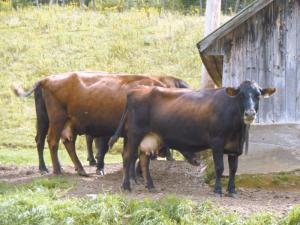Cheese Production May Save Rare Canadienne Cattle
 ✖  |
Mario Duchesne is using cheese to help revive the once common Canadienne dairy breed. Duchesne, the managing director of the Association for the Development of the Canadienne Cattle Breed in Charlevoix, Quebec, notes that there has to be an economic return if herd numbers are to increase sufficiently.
The Association’s efforts are aimed at developing the breed by expanding a network of dairies producing milk to make a specialty, premium cheese.
“We introduced them here in 2007 to produce milk for a local cheesemaker interested in value-added cheese,” says Duchesne. “We know they can’t compete with Holsteins or other major breeds for milk production. However, they’re very high in protein, which is good for cheese production.”
The Canadienne cow was introduced to Quebec more than 400 years ago. Over the past 100 years it drifted across Canada, since it was an ideal cow for small farmers. It was selected for producing on grass and forage, not grain. Duchesne describes Canadiennes as very hardy and frugal, small to medium-sized with a long life span. Average production runs about 11,000 lbs. Red or fawn-colored when young, the cattle may mature to brown and black tones as well.
“They’re very mild tempered and maternal, although if threatened, they’ll react strongly,” he says. “The breed is very hardy and will recover from milk fever or other metabolic diseases where a Holstein won’t. They are also very easy calvers, so fast and easy, there is often not time to get them to a calving pen.”
Duchesne estimates that today there are fewer than 300 Canadiennes left and of them, only 50 that are purebred.
As the breed dwindles, it has become very in-bred. Duchesne hopes that growing interest in using the milk for cheese, as well as advanced genetic research, will combine to save the breed. The Association is conducting genetic testing of existing Canadiennes to determine the rate of inbreeding and the genetic diversity remaining.
“Once we know the genetics, we can work to restore the breed through selection,” says Duchesne.
Contact: FARM SHOW Followup, Association for the Development of the Canadienne Cattle Breed in Charlevoix, 344, 138 road, Saint-Hilarion, Quebec Canada G0A 3V0 (ph 418 457-4333; info@vachecanadienne.com; www.vachecanadienne.com) or Rare Breeds Canada, RR 1, Nesbitt, Manitoba Canada R0K 1P0 (ph 204 573-8204; rbc@rarebreedscanada.org; www.rarebreedscanada.org).

Click here to download page story appeared in.
Click here to read entire issue
Cheese Production May Save Rare Canadienne Cattle LIVESTOCK Beef Mario Duchesne is using cheese to help revive the once common Canadienne dairy breed Duchesne the managing director of the Association for the Development of the Canadienne Cattle Breed in Charlevoix Quebec notes that there has to be an economic return if herd numbers are to increase sufficiently The Association’s efforts are aimed at developing the breed by expanding a network of dairies producing milk to make a specialty premium cheese “We introduced them here in 2007 to produce milk for a local cheesemaker interested in value-added cheese ” says Duchesne “We know they can’t compete with Holsteins or other major breeds for milk production However they’re very high in protein which is good for cheese production ” The Canadienne cow was introduced to Quebec more than 400 years ago Over the past 100 years it drifted across Canada since it was an ideal cow for small farmers It was selected for producing on grass and forage not grain Duchesne describes Canadiennes as very hardy and frugal small to medium-sized with a long life span Average production runs about 11 000 lbs Red or fawn-colored when young the cattle may mature to brown and black tones as well “They’re very mild tempered and maternal although if threatened they’ll react strongly ” he says “The breed is very hardy and will recover from milk fever or other metabolic diseases where a Holstein won’t They are also very easy calvers so fast and easy there is often not time to get them to a calving pen ” Duchesne estimates that today there are fewer than 300 Canadiennes left and of them only 50 that are purebred As the breed dwindles it has become very in-bred Duchesne hopes that growing interest in using the milk for cheese as well as advanced genetic research will combine to save the breed The Association is conducting genetic testing of existing Canadiennes to determine the rate of inbreeding and the genetic diversity remaining “Once we know the genetics we can work to restore the breed through selection ” says Duchesne Contact: FARM SHOW Followup Association for the Development of the Canadienne Cattle Breed in Charlevoix 344 138 road Saint-Hilarion Quebec Canada G0A 3V0 ph 418 457-4333; info@vachecanadienne com; www vachecanadienne com or Rare Breeds Canada RR 1 Nesbitt Manitoba Canada R0K 1P0 ph 204 573-8204; rbc@rarebreedscanada org; www rarebreedscanada org
To read the rest of this story, download this issue below or click
here to register with your account number.







